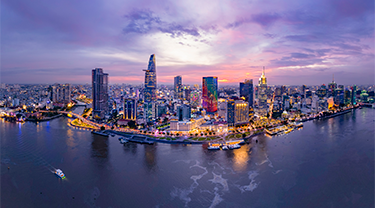
Doing business in Vietnam: Catch this rising star in the Indo-Pacific
Author details
Carol Fragiskos
Contributing international trade writer
In this article:
Look on a map and you’ll understand why Vietnam is called the Land of the Ascending Dragon. While its unique geographical shape may have inspired the original nickname, these days, it could be referring to its rapid economic growth.
Last year, Vietnam’s gross domestic product (GDP) grew by more than 5%, with forecasts for this year and next, sitting at 6% and 7%, respectively. Based on data from World Economics, in the last 10 years, its compound annual growth rate has been more than 8%.
With numbers like these, it’s no wonder Export Development Canada (EDC) chose Vietnam for our next representation in the Indo-Pacific. Scheduled to open in fall 2024, the in-market team will be led by Nathan Nelson, EDC’s first chief representative in Vietnam and innovation director for the Indo-Pacific.
In his new role, Nelson’s intention is clear: Double the amount of trade from Canada to Vietnam in the next five years. Read on to discover why this market is brimming with opportunity for Canadian business.
Vietnam lies at the centre of the Indo-Pacific region. Located near major markets in Asia—with access to key global shipping routes—its strategic location makes it an ideal logistics and distribution hub. But it’s more than geography that makes this country a strong bet.
Its middle-class growth is outpacing all others in the region. Though smaller than some of its neighbours, Vietnam’s population of close to 100 million is significant, especially considering that half are under the age of 30. Although minimum wages are rising, its labour costs are still lower than similar countries in the Indo-Pacific, according to the International Labour Organization. As it shifts to higher-value industrial activities, it’s becoming an increasingly sought-after market for those with manufacturing interests.
Politically stable, its government is committed to economic reform and liberalization. Its progressive foreign investment environment offers tax incentives and preferential rates in certain priority sectors and geographic areas. Perhaps more importantly, a transparent legal framework and predictable regulatory regime provide additional confidence for companies looking to do business in this market.
Vietnam is investing heavily into infrastructure development. Committed to net zero by 2050, the country’s also looking to rapidly increase its renewable energy mix. Multiple nationwide projects are underway in green energy, waste management and sustainable urban development.
Vietnam has a healthy digital economy expected to reach $52 billion by 2025. Multiple sectors—including e-commerce, financial technology and artificial intelligence—have been boosted by initiatives that support innovation and entrepreneurship.
As a member of several bilateral and multilateral free trade agreements—including with China, India, the European Union and the Association of Southeast Asian Nations (ASEAN)—Vietnam is a country that’s wide open for business.
Canadian exporters have preferential access to this fast-growth market through the Comprehensive and Progressive Agreement for Trans-Pacific Partnership (CPTPP), which eliminates tariffs and reduces barriers for 98% of exports to member states. The free trade agreement, between Canada and 10 other countries in the Indo-Pacific, also provides for intellectual property (IP) protections, clear rules of origin, customs and trade facilitation, regulatory co-operation, and trade in services and labour mobility.
Vietnam is Canada’s largest trading partner in the ASEAN, with bilateral trade in goods totalling $14 billion in 2023. Unfortunately, that trade is one-sided, with Canada’s exports to Vietnam under $1 billion, and primarily in resource-level products such as agri-foods, fertilizer, fuels, and pulp and paper. This explains Nelson’s agenda to double down in the market.
“After a lot of market analysis, we can confidently say that Vietnam has something for everyone. It’s the new star in the Indo-Pacific, especially for companies looking to diversify beyond China,” says Nelson.
But timing is critical, he warns, and that time is now. “We’re at the point when our exporters need to move quickly to capitalize on the current opportunities, especially given all of the investments being made in this region by the Government of Canada and EDC.”
Nelson and his team have been aggressively building critical contacts on the ground. His strategy is laser-focused: Find the largest players in the market, develop financial and intelligence-sharing relationships, and use those ties to help Canadian companies gain a foothold in the country.
“We need the inside track on ‘Who’s who’ in the market,” Nelson explains. “I’m not interested in the long list or even the short list—I want the real list. If I have a Canadian infrastructure company with a particular specialization, I want to be able to say to them, ‘Call these three people.’”
Building deep relationships with regional conglomerates takes time and money. EDC has a history of building similar global relationships, with financing acting as the foot in the door. Nelson would like to see EDC increase the financing available to these mega influencers within the next two to three years.
“We need to be a player in Vietnam. We need to go in with a big amount of financing, so we can be positioned alongside the billions they get offered from the United States (U.S.), Japan, Korea, China and others.”
You should also check out
The Indo-Pacific region offers vast potential for Canadian companies.
Doing business in Vietnam—as in the Indo-Pacific in general—comes with a steep learning curve. But if you’re already doing business in China, you could make solid gains in Vietnam, as well.
Edmonton-based NELSON Environmental Group has experience in both markets. In fact, company president, Darryl Nelson (no relation to Nathan Nelson), credits the time they invested learning how business is done in China with helping them win business in Vietnam. “Their cultures are vastly different, but their approach to business is quite similar,” he explains, adding that their administration systems, while relatively alike, are totally different from the West.
Nelson’s experience in China revealed how intricately woven their government is in all aspects of business. “In many ways, it functions as one enormous company. This is different than what we’re used to in North America or Europe, but it’s an important difference to understand and to learn how to navigate. And it helped us step more comfortably into Vietnam,” he says.
A global leader in soil remediation, the innovative cleantech company now has team members in Hanoi and Ho Chi Minh City, working through the initial design stages of a project that will likely take from four to 10 years to complete. “It’s a massive undertaking for us—one that’s going to literally transform our company,” he says.
Julia Nguyen, a member of EDC’s Global Business Development team, echoes Nelson’s observations about the level of government involvement in both countries’ business domains. Born and educated in Vietnam, Nguyen worked in the private and public sectors, including a number of embassies in Hanoi, before moving to Canada six years ago. Her 15 years in market provide her with a diverse perspective and has enabled her to hone her skills in navigating the various administrative bodies in Vietnam.
Despite the similarities noted above, she thinks that Vietnam may offer companies fewer business challenges than China. But there are sensitivities to consider. She cautions that “Vietnamese people don’t want to hear that they’re similar to China or any other market in the region. And their business leaders don’t want international companies to view their market as China plus one.” Still, with the right strategy, she thinks that Canadian companies can translate their learnings from China to diversify into Vietnam.
Nguyen acknowledges the challenges of overcoming patronage networks, a huge bureaucracy, IP issues and cultural misunderstandings, but argues that those are quickly becoming concerns of the past. She’s encouraged by the willingness demonstrated by Vietnam’s government to change and reform, pointing to the recruitment of younger, Western-trained leaders.
While the growth of the middle class throughout the region is often noted, Nguyen explains that the trajectory is different in Vietnam. Some Indo-Pacific countries have a small middle class that’s much wealthier than the lower-income population. In Vietnam, middle-class incomes are modest in comparison, but enjoyed by a larger share of the population. “They’re everywhere, this new middle class. There aren’t the same huge gaps in Vietnam that still exist in Thailand, the Philippines, or Indonesia.”
According to Nguyen, Vietnam’s growing middle class isn’t simply interested in the products coming from Canada and the U.S.—they’re obsessed with them. “Maybe 10 years ago, they were starting to buy cautiously, but now they’re all in: It’s buy, buy, buy! And they’re very environmentally conscious, as well,” she adds.
There are a number of key sector and subsector opportunities in Vietnam that Canadian companies should explore, including:
- Advanced manufacturing
- Agriculture, food and beverages
- Clean technology
- Information and communications technologies
- Infrastructure
EDC’s Nathan Nelson observes that the country’s been investing heavily in infrastructure development and is already an incredible manufacturing hub. For those reasons, he’s focused on identifying which advanced manufacturing and infrastructure projects mesh closest with Canadian capabilities, so he can foster connections and build capacity.
“I think the types of companies that are going to thrive in Vietnam are those that have high value and a higher price tag. We’re rarely going to win on price, but we can definitely win on innovation,” he adds. “We know that advanced medical devices and tooling have found a viable market in South Korea. I’m looking to replicate that success in Vietnam, where we’re actually quite competitive on all fronts.”
It’s in those niche sectors that Nelson thinks real growth will be most effectively achieved through the sale of higher value goods and services.
Nelson’s team is working closely with the Trade Commissioner Service (TCS) in Hanoi and Ho Chi Minh City to identify where they can make the most impact. In a government-centric market, Nelson’s been focused on building strategic relationships with key administrations, including their Ministry of Industry and Trade. Equipped with a deeper operational understanding, EDC’s in-market team will be better poised to help Canadian companies navigate the business environment.
When asked what it takes for Canadian companies to succeed in Vietnam, his response is simple, yet complex: It all boils down to persistence. He recalls the experience of one Canadian exporter, who assumed that the wonderful dinner he enjoyed in the home of a potential Vietnamese customer meant the deal was done. One year later, he was scratching his head, wondering why the order still hadn’t come through.
“Don’t assume you have a great relationship because of one meeting, or even a couple of meetings,” Nelson cautions. “You have to continue the conversation, make regular contact, including multiple visits in market.” To succeed in Vietnam, you need to up your game: Become more assertive in finding opportunities, build solid relationships, and most importantly, persist until you close the deal.
Years of struggle to gain their independence have left the Vietnamese with a strong sense of national pride. Confucianism has also seasoned Vietnamese society, placing great importance on the relationships that people have with each other. Here are eight etiquette tips for doing business in Vietnam:
1. Shaking hands in Vietnam is done with both hands, with an added light bow for respect.
2. Upon greeting your Vietnamese friend say, “Hello,” or “xin chao” (pronounced: seen chow). Vietnamese is a tonal language, and you would impress your new associate with proper pronunciation.
3. Use both hands when receiving and giving business cards, or whenever passing an object to another person.
4. Be punctual.
5. The Vietnamese style of dining is rice bowls and chopsticks. Some at-home practice may be required to master the technique.
6. Food is placed on dishes in the centre of the table and shared.
7. An offer of tea at a meeting is a ceremonial form of hospitality and should never be refused.
8. For business, dress conservatively.
EDC’s Export Help Hub provides expert answers to the most frequently asked trade-related questions. Create a free account to see our advisor’s answers to these questions about Vietnam and ask your own.
Interested in growing your business in Vietnam and the Indo-Pacific?
Connect with EDC and watch your business flourish on the international stage.
Answer a few questions about your company to learn more about how EDC can help to fuel your expansion in the Indo-Pacific.
















